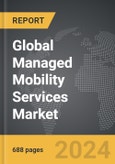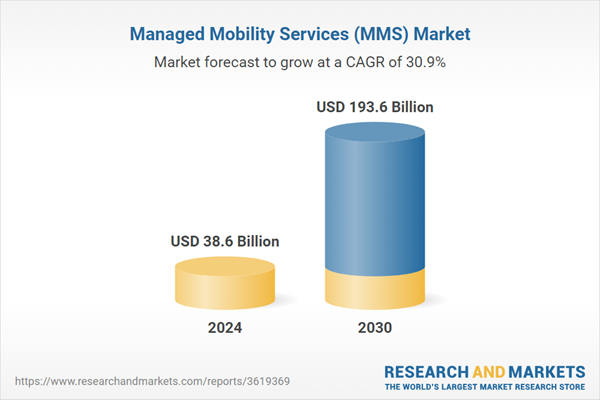Global Managed Mobility Services (MMS) Market - Key Trends & Drivers Summarized
Managed Mobility Services (MMS) have emerged as a critical solution for organizations seeking to efficiently manage their mobile devices, applications, and connectivity. MMS encompasses a comprehensive suite of services designed to streamline the deployment, management, and support of mobile devices across an enterprise. This includes device procurement, provisioning, and configuration, as well as ongoing management tasks such as software updates, security enforcement, and troubleshooting. By outsourcing these functions to a managed service provider, companies can ensure that their mobile workforce remains productive and secure, while also reducing the complexity and costs associated with managing a diverse array of mobile devices and platforms. MMS providers offer tailored solutions that cater to the specific needs of different industries, ensuring compliance with relevant regulations and standards.Technological advancements and the increasing complexity of mobile ecosystems have significantly influenced the evolution of MMS. The proliferation of smartphones, tablets, and other mobile devices in the workplace, combined with the rise of bring-your-own-device (BYOD) policies, has created new challenges for IT departments. Managed mobility services address these challenges by providing centralized management and support for a wide range of devices and operating systems. Advanced MMS solutions leverage cloud-based platforms and automation tools to enhance efficiency and scalability, enabling organizations to quickly adapt to changing business needs and technological advancements. Security remains a paramount concern, with MMS providers offering robust solutions to protect sensitive data and ensure compliance with security policies. Features such as remote wipe, encryption, and real-time threat detection are integral to maintaining the integrity and confidentiality of corporate information.
The growth in the managed mobility services market is driven by several factors. The increasing reliance on mobile devices for business operations and the need for seamless connectivity and productivity are primary drivers. As organizations continue to embrace digital transformation, the demand for efficient and secure mobile management solutions is growing. The rise of remote and hybrid work models has further accelerated the adoption of MMS, as companies seek to support a distributed workforce with reliable and secure mobile solutions. Growing focus on leveraging mobility solutions for increasing productivity and performance of mobile staff, increasing collaboration, optimizing resource utilization, improving management of day to day business functions, enhancing customer experience and engagement and thereby achieving competitive advantage, continues to drive robust demand for MMS among companies globally. Technological advancements, such as the integration of artificial intelligence (AI) and machine learning (ML) in MMS platforms, are enhancing the capabilities and effectiveness of these services, attracting more businesses. Additionally, the growing emphasis on cost optimization and operational efficiency is encouraging companies to outsource their mobility management needs to specialized providers. These factors, along with the continuous evolution of mobile technologies and increasing regulatory requirements, are expected to drive sustained growth in the managed mobility services market in the coming years.
Report Scope
The report analyzes the Managed Mobility Services (MMS) market, presented in terms of market value (USD). The analysis covers the key segments and geographic regions outlined below.- Segments: Function (Device Management, Application Management, Security Management, Support & Maintenance); Vertical (IT & Telecom, Manufacturing, Retail, BFSI, Transportation & Logistics, Healthcare, Other Verticals).
- Geographic Regions/Countries: World; USA; Canada; Japan; China; Europe; France; Germany; Italy; UK; Spain; Russia; Rest of Europe; Asia-Pacific; Australia; India; South Korea; Rest of Asia-Pacific; Latin America; Argentina; Brazil; Mexico; Rest of Latin America; Middle East; Iran; Israel; Saudi Arabia; UAE; Rest of Middle East; Africa.
Key Insights:
- Market Growth: Understand the significant growth trajectory of the Device Management Function segment, which is expected to reach US$107.2 Billion by 2030 with a CAGR of 30.9%. The Application Management Function segment is also set to grow at 26.9% CAGR over the analysis period.
- Regional Analysis: Gain insights into the U.S. market, valued at $13.9 Billion in 2024, and China, forecasted to grow at an impressive 41.2% CAGR to reach $27.4 Billion by 2030. Discover growth trends in other key regions, including Japan, Canada, Germany, and the Asia-Pacific.
Why You Should Buy This Report:
- Detailed Market Analysis: Access a thorough analysis of the Global Managed Mobility Services (MMS) Market, covering all major geographic regions and market segments.
- Competitive Insights: Get an overview of the competitive landscape, including the market presence of major players across different geographies.
- Future Trends and Drivers: Understand the key trends and drivers shaping the future of the Global Managed Mobility Services (MMS) Market.
- Actionable Insights: Benefit from actionable insights that can help you identify new revenue opportunities and make strategic business decisions.
Key Questions Answered:
- How is the Global Managed Mobility Services (MMS) Market expected to evolve by 2030?
- What are the main drivers and restraints affecting the market?
- Which market segments will grow the most over the forecast period?
- How will market shares for different regions and segments change by 2030?
- Who are the leading players in the market, and what are their prospects?
Report Features:
- Comprehensive Market Data: Independent analysis of annual sales and market forecasts in US$ Million from 2024 to 2030.
- In-Depth Regional Analysis: Detailed insights into key markets, including the U.S., China, Japan, Canada, Europe, Asia-Pacific, Latin America, Middle East, and Africa.
- Company Profiles: Coverage of players such as Cisco Systems, Inc., AT&T, Inc., BlackBerry Ltd., Capgemini SE, Azzurri Communications Ltd. and more.
- Complimentary Updates: Receive free report updates for one year to keep you informed of the latest market developments.
Some of the 146 companies featured in this Managed Mobility Services (MMS) market report include:
- Cisco Systems, Inc.
- AT&T, Inc.
- BlackBerry Ltd.
- Capgemini SE
- Azzurri Communications Ltd.
- Accely Group
- Damovo Deutschland GmbH & Co. KG.
- Deloitte Touche Tohmatsu Ltd.
- Dell Technologies, Inc.
- Agreeya Solutions, Inc.
- ALE International
- Amtel
- Asdeq Labs
- Cass Information Systems, Inc.
- Computacenter
This edition integrates the latest global trade and economic shifts into comprehensive market analysis. Key updates include:
- Tariff and Trade Impact: Insights into global tariff negotiations across 180+ countries, with analysis of supply chain turbulence, sourcing disruptions, and geographic realignment. Special focus on 2025 as a pivotal year for trade tensions, including updated perspectives on the Trump-era tariffs.
- Adjusted Forecasts and Analytics: Revised global and regional market forecasts through 2030, incorporating tariff effects, economic uncertainty, and structural changes in globalization. Includes historical analysis from 2015 to 2023.
- Strategic Market Dynamics: Evaluation of revised market prospects, regional outlooks, and key economic indicators such as population and urbanization trends.
- Innovation & Technology Trends: Latest developments in product and process innovation, emerging technologies, and key industry drivers shaping the competitive landscape.
- Competitive Intelligence: Updated global market share estimates for 2025, competitive positioning of major players (Strong/Active/Niche/Trivial), and refined focus on leading global brands and core players.
- Expert Insight & Commentary: Strategic analysis from economists, trade experts, and domain specialists to contextualize market shifts and identify emerging opportunities.
Table of Contents
Companies Mentioned (Partial List)
A selection of companies mentioned in this report includes, but is not limited to:
- Cisco Systems, Inc.
- AT&T, Inc.
- BlackBerry Ltd.
- Capgemini SE
- Azzurri Communications Ltd.
- Accely Group
- Damovo Deutschland GmbH & Co. KG.
- Deloitte Touche Tohmatsu Ltd.
- Dell Technologies, Inc.
- Agreeya Solutions, Inc.
- ALE International
- Amtel
- Asdeq Labs
- Cass Information Systems, Inc.
- Computacenter
Table Information
| Report Attribute | Details |
|---|---|
| No. of Pages | 688 |
| Published | February 2026 |
| Forecast Period | 2024 - 2030 |
| Estimated Market Value ( USD | $ 38.6 Billion |
| Forecasted Market Value ( USD | $ 193.6 Billion |
| Compound Annual Growth Rate | 30.9% |
| Regions Covered | Global |









